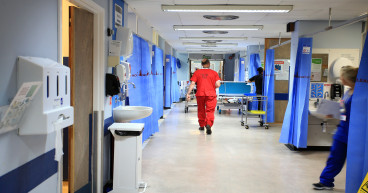0R15 8734.0 0.0% 0R1E 8259.0 1.325% 0M69 20850.0 65.6076% 0R2V 229.142 1.6151% 0QYR 1467.5 1.5922% 0QYP 416.4 -2.0235% 0RUK None None% 0RYA 1530.0 -2.8571% 0RIH 171.8 0.0% 0RIH 173.7 1.1059% 0R1O 203.04 10077.4436% 0R1O None None% 0QFP 5040.0 0.0% 0M2Z 263.55 -2.235% 0VSO 31.97 -10.2092% 0R1I None None% 0QZI 565.0 0.0% 0QZ0 220.0 0.0% 0NZF None None% 0YXG 163.21 -2.076%
World news
Government should declare national NHS major incident, warns health chief

Image Source: PAMEDIA
The Government should declare a national NHS major incident to rescue the healthcare system from the current crisis, a senior health official said.
It would mean all four UK nations would coordinate their response and allocate resources to help meet the overwhelming demand for care that is enveloping many hospitals around the country.
Dr Tim Cooksley, president of the Society for Acute Medicine (SAM), said: “The current situation in urgent and emergency care is shocking. It is in a critical state for patients and it is an extremely difficult for healthcare staff who are unable to deliver the care they want to.
“Political leaders across the UK need to listen, meet urgently and accept the need to declare a national NHS major incident.
“The outcome must be a four-nation emergency strategy which results in short-term stabilisation, medium-term improvement and long-term growth – the grave situation we are in means it will be a long journey.
“Sustainable workforce and capacity plans are required urgently to boost morale among staff and patients – as we have long called for – and we now need to see action.”
Early on New Year’s Day, interim chief executive of NHS Providers Saffron Cordery told the PA news agency that the NHS is under “equivalent levels of pressure” as during the early stage of the pandemic.
Dr Cooksley said many of the current problems are not new and that a number of recommendations had been outlined since the pandemic that offer the “best hope” of a short-term solution.
He said: “These cover, among other things, increased investment in primary care, social care, mental health and ambulance services and quick-access phone lines for communication between secondary and primary care.
“There must be a seven-day range of healthcare options to which NHS 111 and primary care can direct patients and hospitals must urgently expand same day emergency care – delivered by acute medical teams – for patients referred from primary care and NHS 111.
“Patients with specialty hospital referrals need a rapid response and a treatment plan that minimises unnecessary admission to improve flow and prevent delays so they can be moved from ambulances quickly and treated in safe areas.
“Diagnostic and support services must be available seven days a week to maintain patient flow and local healthcare systems must expand community care.
“Discharge planning should commence on admission and be optimised so that patients discharged from hospital are transferred to an environment with tailored support for their health and care at an appropriate time of the day.
“This is a time of crisis and there are fears this will worsen further over the coming months, so leaders must prioritise those improvements we can make now that will help us to navigate this turbulent period.”